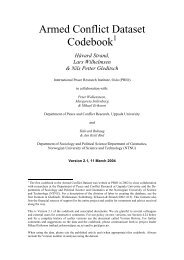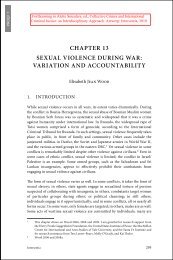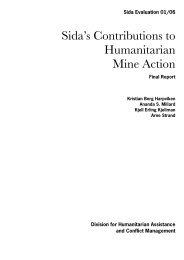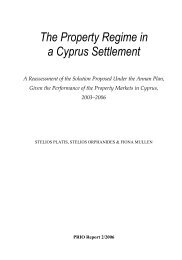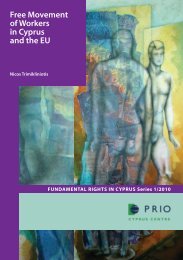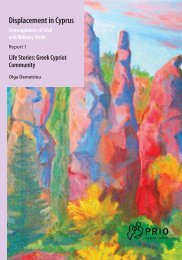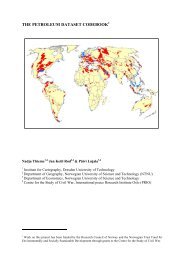Towards a Property Settlement in Cyprus - PRIO
Towards a Property Settlement in Cyprus - PRIO
Towards a Property Settlement in Cyprus - PRIO
Create successful ePaper yourself
Turn your PDF publications into a flip-book with our unique Google optimized e-Paper software.
13<br />
DISPLACEMENT IN CYPRUS AND<br />
THE PROPERTY ISSUE<br />
Ayla Gurel<br />
Dur<strong>in</strong>g the 1963–64 period, it is estimated that around 25,000 turkish cypriots (onequarter<br />
of the turkish cypriot population at that time), and 700 Greek cypriots<br />
(<strong>in</strong>clud<strong>in</strong>g 500 armenians) were displaced. most of these people were still displaced<br />
when the events of 1974 struck, lead<strong>in</strong>g to the present de facto division of cyprus <strong>in</strong>to a<br />
turkish cypriot-controlled north and a Greek cypriot-controlled south.<br />
Division had long-term drastic consequences. large-scale displacement upset the lives of<br />
many local communities and led to restrictions as regards cypriot <strong>in</strong>dividuals’ freedom to<br />
travel and settle throughout the island and exercise property rights. nearly all of the 162,000<br />
Gc <strong>in</strong>habitants of the area to the north of the divide fled or moved to the south. similarly almost<br />
all of the estimated 48,000 tcs then liv<strong>in</strong>g <strong>in</strong> the south moved to take refuge <strong>in</strong> the north. these<br />
population transfers rendered the two parts of the island <strong>in</strong> effect ethnically homogenised.<br />
until april 2003, travel between north and south was virtually impossible for cypriots.<br />
<strong>in</strong> 1974, with such a high proportion of the population hav<strong>in</strong>g been displaced and thus<br />
hav<strong>in</strong>g lost their homes and properties, a huge humanitarian problem emerged. the situation<br />
<strong>in</strong> the south was obviously more dire, given the overcrowd<strong>in</strong>g caused by the sudden <strong>in</strong>flux<br />
of so many displaced persons and scarcity of resources available for accommodat<strong>in</strong>g them.<br />
for the tcs, on the other hand, the move was from conf<strong>in</strong>ement <strong>in</strong> enclaves to – what they<br />
regarded as – freedom <strong>in</strong> the northern one-third of the island. the ma<strong>in</strong> challenge <strong>in</strong> the<br />
north was to organise efficient and productive utilisation of abundant property and resources<br />
left beh<strong>in</strong>d by the Gcs – a task hampered by the <strong>in</strong>sufficient size of the tc population.<br />
<strong>in</strong> the elapsed period of over three decades the displaced persons <strong>in</strong> both parts of the<br />
island have been accommodated and have largely adapted to their new environments.<br />
However, claims related to their lost homes and properties have been unsettled until now.<br />
as regards proportions of land left beh<strong>in</strong>d by Gcs and tcs <strong>in</strong> the two parts of the island,<br />
there is no set of figures accepted by both sides. the discrepancy between the two sides’<br />
figures is quite considerable. However, what seems undisputed is that more than half of the<br />
total land <strong>in</strong> the north is Gc property, and that tc property left <strong>in</strong> the south is as much as<br />
about a third of what the Gcs left <strong>in</strong> the north.<br />
the property issue is probably the most complicated item on the agenda of the current<br />
nego tiations for a cyprus settlement. a major difficulty here stems from disagreements between



